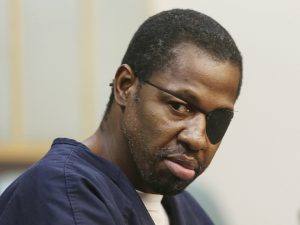by Jordan Smith
The top prosecutor in Orlando, Florida, took to a podium outside the Orange County courthouse last week to outline a new policy: Her office would no longer seek the death penalty in any capital case.

The prosecutor, State Attorney Aramis Ayala, told assembled reporters that seeking the death penalty is “not in the best interests of this community or in the interest of justice.” After considerable research, she said, she had concluded that capital punishment offers no empirical benefits to society: It is not a deterrent, it neither enhances public safety nor protects law enforcement officers from violence, and it costs millions more – in litigation and housing – to kill a defendant than it does to confine them behind bars for life.
And in Florida in particular, she said, the death penalty system has been the “cause of considerable legal chaos, uncertainty and turmoil.”
The top prosecutor in Orlando, Florida, took to a podium outside the Orange County courthouse last week to outline a new policy: Her office would no longer seek the death penalty in any capital case.
Indeed, the U.S. Supreme Court last year found the state’s capital sentencing scheme unconstitutional. Florida’s highest court subsequently concluded that more than 200 of the 381 inmates on death row in the state could be eligible for new sentencing hearings as a result of the Supreme Court ruling.
And in Florida in particular, she said, the death penalty system has been the “cause of considerable legal chaos, uncertainty and turmoil.”
Even with the system in such disarray, Ayala’s decision to stop seeking the death penalty was bound to be controversial. But the announcement has kicked off a fire storm – especially due to its impact on a high-profile murder case, in which a man named Markeith Loyd is accused of killing his pregnant ex-girlfriend and, perhaps more politically potent, an Orlando police officer.
The controversy sets Ayala, the first Black elected state attorney in Florida, who campaigned last year on a promise to reduce racial disparities in the criminal justice system, against Florida Republican Gov. Rick Scott and the knee-jerk “tough-on-crime” politics still prominent in the state.

Loyd opened fire on his ex-girlfriend, Sade Dixon, and her brother last December, killing Dixon and critically injuring her brother before fleeing the scene. Several weeks later he shot and killed police Lt. Debra Clayton when she approached him in a parking lot. He was finally arrested after a nine-day manhunt. At a press conference with Ayala standing behind him, Orlando Police Chief John Mina expressed relief that Loyd had finally been apprehended. “I was extremely happy that this dangerous person was off the street,” he said.
Last week Mina told the Orlando Sentinel that he is now “furious” with Ayala’s decision not to seek death for Loyd. “If there was [ever] a case for the death penalty, this is the case.”
The Loyd case prompted Gov. Scott to intervene. On the same day that Ayala announced her new policy, Scott asked her to recuse herself from prosecuting the case, and then, when she declined to do so, issued an executive order to forcibly remove and replace her by bringing in a prosecutor from another jurisdiction.
The controversy sets Ayala, the first Black elected state attorney in Florida, who campaigned last year on a promise to reduce racial disparities in the criminal justice system, against Florida Republican Gov. Rick Scott and the knee-jerk “tough-on-crime” politics still prominent in the state.
“She has made it clear that she will not fight for justice and that is why I am using my executive authority to immediately reassign the case,” he said in a press statement.
Scott’s decision has prompted its own backlash, with more than 130 legal scholars – including two former chief justices of the Florida Supreme Court – signing on to a letter to the governor challenging the legality of his interference.
“She has made it clear that she will not fight for justice and that is why I am using my executive authority to immediately reassign the case,” he said in a press statement.
Notably, Dixon’s mother has said she supports Ayala’s decision not to seek the death penalty for her daughter’s murderer. Lt. Clayton’s family has not commented publicly on the matter.
Policy versus politics
Ayala was among a number of progressive prosecutors who trounced old-school hardliners in 2016 elections.
“Prosecution has been known as, ‘We have evidence, we proved [the] case. Done,’” Ayala said last year. “The mindset of the people who just wanted more integrity, more transparency, more consistency, higher levels of justice, they opened their arms to my campaign.”

Given the tenor of her campaign, it is not entirely surprising that Ayala would decide that Florida’s death penalty scheme is untenable. In announcing her decision last week, Ayala stressed that she was approaching the matter dispassionately. She had not arrived at her decision “arbitrarily or emotionally.” Rather, she said, it was an “evidence-based policy decision.”
Scott’s split-second reaction to oust Ayala suggests a different approach – and one that is legally questionable.
It is true that a Florida statute provides the governor with a mechanism to replace a state attorney, when that prosecutor is “disqualified” from representing the state or “for any other good and sufficient reason.” Exactly what that means is unclear, said Karen Gottlieb, co-director of the Florida Center for Capital Representation at Florida International University School of Law.
“It’s very vague, frankly,” Gottleib said. She notes that state law also requires Ayala to be elected by the people in the district she represents, and to uphold their values and priorities. She is also charged with using discretion in carrying out her duties. Scott’s actions step on her ability to represent for the voters who elected her, Gottlieb argues. If the death penalty were a mandatory punishment, that might be one thing, but it is not – the U.S. Supreme Court has outlawed the death penalty as a mandatory punishment – and choosing when and if to seek death is an entirely discretionary matter.
“It doesn’t seem like there’s any possible assertion that [Ayala’s decision] is in bad faith or that she is refusing to exercise her discretion, which would be a different situation, or if it were mandatory and she said, ‘I’m not going to do it,’” Gottlieb said. Instead, it is simply a situation of Scott “substituting his views with her exercise of discretion. And I think that’s a dangerous precedent.”
She had not arrived at her decision “arbitrarily or emotionally.” Rather, she said, it was an “evidence-based policy decision.” Scott’s split-second reaction to oust Ayala suggests a different approach – and one that is legally questionable.
That same point is made in the letter that judges, prosecutors and law professors sent to Scott this week. Not all of the signatories agree with Ayala’s decision. However, they wrote, “we do agree that she had the authority and discretion to make it.”
“The governor picking and choosing how criminal cases are prosecuted, charged or handled in local matters is troubling as a matter of policy and practice,” the letter continues.
Ayala has signaled that she will fight back; on Monday she filed a motion seeking to stay the Loyd case until the matter is sorted out. In the document, Ayala says Scott called her just hours after she made her announcement to ask her to leave the Loyd case. After refusing to step aside, she “asked Gov. Scott if I could explain all that had gone into my decision,” she wrote. “Scott said he was only interested in my recusal and refused to have a detailed conversation.”
The motion also states that the governor does not have the power to remove her, “a popularly elected State Attorney.” Under the Florida Constitution, Ayala argues, “I retain complete authority over charging and prosecution decisions.”
It’s not just the governor’s office that has gone after Ayala.
A finance director in the Seminole County courts office, Stan McCullars, was suspended after he posted racially charged messages on Facebook. “Maybe SHE should get the death penalty,” he wrote. “She should be tarred and feathered if not hung from a tree.”
Other elected state’s attorneys felt the need to issue a statement saying they would certainly continue to seek the death penalty in qualified cases. State lawmakers have proposed slashing the budget for Ayala’s office as punishment. And Republican state Rep. Scott Plakon has suggested Scott should permanently remove Ayala from office.
“In responding to lawlessness, I think that the governor should use the laws as they are in every way to stop lawlessness if it is possible,” Plakon said.
In direct contrast to the histrionic response of Scott and others, Ayala has articulated her decision in a plain and reasoned way.
“An analysis of [the] death penalty must be pragmatic, it must be realistic and not simply theoretical, impulsive or emotional,” she said last week. “I am prohibited from making the severity of sentences the index of my effectiveness.”
Jordan Smith is a state and national award-winning investigative journalist based in Austin, Texas. With a talent for analyzing complex social and legal issues, she is regarded as one of the best investigative reporters in Texas and has been published in The Nation, Salon and other influential outlets, including The Intercept, where this story first appeared. Contact her at jordan.smith@theintercept.com.
Update: It’s just been announced that hundreds of Black Florida residents from all over the state will be riding on buses to Gov. Rick Scott’s office in Tallahassee next week for the #StandWithAramis rally organized by Color of Change. Learn more and help out at https://secure.actblue.com/contribute/page/ride_for_aramis?akid=7170.699.PFnbku&amount=25&=&rd=1&refcode=cleanup_7170&t=5.





